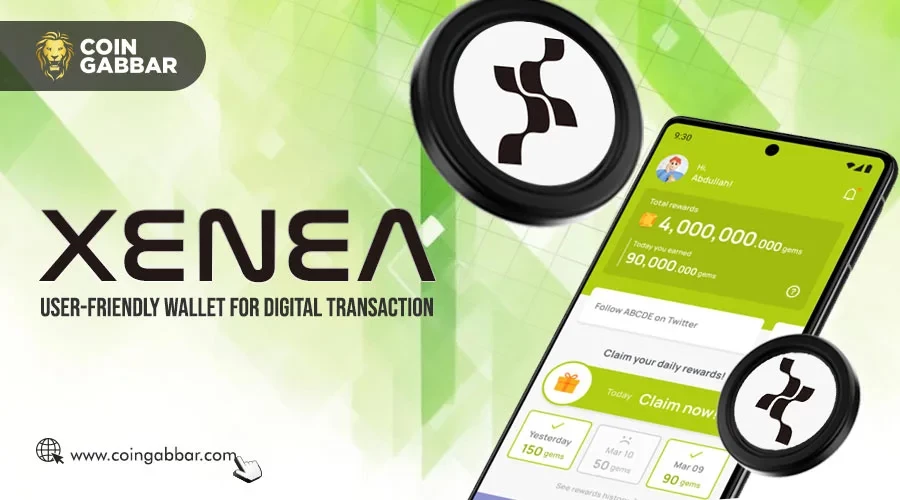
Xenea Wallet is a digital wallet, which is a blockchain-based storage. It is created for financial transactions and rewards. It has a user-friendly interface and support for social login, which makes it easy to access for beginners. This wallet is compatible with cryptocurrency, created for the two-layered Xenea ecosystem. It includes a wallet layer and a Voting module, that conducts an automatic response mechanism that is based on voting.
The user-friendly framework manages private keys of the users without them being concerned about it. It is possible with the platform’s proprietary patented technology. It also allows users to take part in the mining process by PoD.
All the features of Xenea will be implemented in 4 different phases. It will enable seamless integration of Xenea Wallet in the Xenea Ecosystem. It will offer an efficient and secure experience to users while participating in the voting and mining processes.
Private key generation and storage
Xenea Wallet’s Patented technology supports private key generation and storage. Although this approach is considered more prone to hacking as the private keys are managed by the individual. Hard wallets are created to reduce this risk without joining it to a decentralised network that works automatically. Decentralised networks were used traditionally which used to operate more securely but were not that convenient when compared.
Xenea has created a technology to overcome this issue, get secure and convenient operations in the financial digital marketplace. It has registered a patent.
What is Xenea?
Xenea is a Layer 1 blockchain that is EVM-compatible (meaning it works with Ethereum-based apps). It also has built-in decentralized storage, so important data stays safe.
The technology has been reviewed and approved by top computer science organizations, including IEEE. Experts have recognized Xenea as a strong and reliable system.
EVM-Compatible: Developers can use the same tools they already know to build apps on Xenea.
Proof of Democracy (PoD): Unlike other systems that rely on token prices for security, PoD allows many people to participate in securing the network, making transactions safe for years to come.
Decentralized Autonomous Content Storage (DACS): Xenea has built-in storage to keep digital assets and their data safe and accessible forever.
Network Currency
Governance
Block Rewards
Collateral for DACS
Rewards for Contributors
The total supply of XENE tokens is 1,832,810,964 XENE. These tokens come from two sources:
1,201,658,964 XENE (about 65.6%) were created in the Genesis block.
631,152,000 XENE (about 34.4%) will be created later through mining.
At the start, 1,201,658,964 XENE will be issued in the Genesis block.
The team will soon announce how these tokens will be distributed and if any will be locked for a certain period.
If extra tokens are needed during the mainnet beta phase, they will come from the team’s planned allocation for ecosystem growth.
Mining rewards system is designed to keep the network running smoothly and encourage people to participate.
Each block reward helps pay those who support the network, including node operators and DACS nodes. By rewarding these contributors, the platform encourages the growth of dApps (decentralized apps) and ensures the ecosystem stays strong and active.
Xenea uses a special mining system called Proof of Democracy (PoD) to reward network contributors. There are two ways to earn mining rewards:
Consensus contributions – This encourages users to hold tokens in escrow and vote on decisions, helping make the network more secure and decentralized.
Storage contributions – This rewards DACS node operators who store data responsibly for a long time.
Mining will begin when Xenea’s mainnet launches. A total of 631,152,000 XENE is reserved for mining rewards, and no extra tokens will be created after that.
Xenea's network will have different types of nodes supporting it. Each time a new block is generated (every minute), mining rewards will be distributed among these nodes.
Source: Xenea Whitepaper
The Roadmap is outlined as follows:
In 2024, Q3: Xenea Wallet Released
In 2024, Q4: A Web Wallet for All introduced (social login, payment integration, and no seed phrase, no secret key, no problem with patent.)
In 2025, H1: Mining for everyone (through consensus PoD)
In 2025, H2: Beginning integration with the financial sector (through WaaS, Wallet as a Service).
In 2026, Token graph database function.
It uses a special system called Voting Proof-of-Democracy (PoD) to keep its blockchain secure and energy-efficient. This system was created by Xenea itself.
Here’s how it works:
Escrow nodes are special computers (called validator nodes) that help manage the network.
These nodes are chosen randomly to select voting nodes.
The voting nodes then vote to confirm transactions in a safe and transparent way.
This process helps keep the blockchain secure while using less power.
Xenea is developed to make finance more accessible to everyone and help people pass down valuable assets to future generations.
The developers believe that real-world assets (RWAs) will become tokenized (turned into digital tokens), and NFTs will play a big role in this. But right now, many NFTs store important data outside the blockchain. This is risky because:
The asset’s data might get lost.
Ownership records could become unclear.
Xenea solves this by keeping both the tokens and their data consistent so that digital assets remain secure and transferrable over time.
Xenea offers a powerful, secure, and energy-efficient blockchain with unique features like Proof-of-Democracy and decentralized storage. Its ecosystem, including the Xenea crypto Wallet and mining rewards, provides users with a seamless experience for secure financial transactions, voting, and participation in the growing world of digital assets.

Muskan Sharma is a crypto journalist with 2 years of experience in industry research, finance analysis, and content creation. Skilled in crafting insightful blogs, news articles, and SEO-optimized content. Passionate about delivering accurate, engaging, and timely insights into the evolving crypto landscape. As a crypto journalist at Coin Gabbar, I research and analyze market trends, write news articles, create SEO-optimized content, and deliver accurate, engaging insights on cryptocurrency developments, regulations, and emerging technologies.